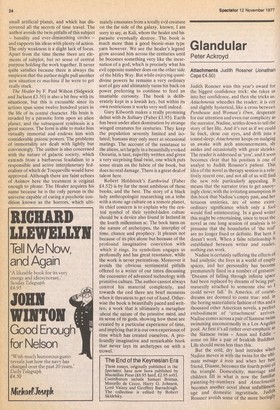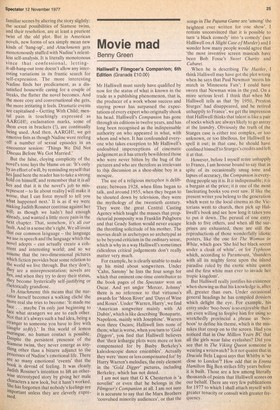Glandular
Peter Ackroyd
Attachments Judith Rossner (Jonathan Cape E4.50) Judith Rossner wins this year's award for the biggest confidence trick: she takes us into her confidence, and then she tricks us. Attachments wheedles the reader; it is coy and slightly hysterical, like a cross between Penthouse and Woman's Own, desperate for our attention and even our complicity as the narrator, Nadine, settles down to tell the story of her life. And it's not as if we could lie back, close our eyes, and drift into a sound sleep: Attachments keeps on nudging us awake with arch announcements, sly asides and occasionally with great shrieks, The reader is addressed as 'you', and it soon becomes clear that his position is one of analyst to Judith Rossner's patient. This idea of the novel as therapy session is a relatively recent one, and not all of us will find the new role particularly appealing. It means that the narrator tries to get annoyingly close; with the irritating assumption in this book that Nadine's empty past, and her tenuous anxieties, are of some extraordinary significance which only a fool would find uninteresting. In a good writer this might be entertaining, since to treat the novel as one long session of analysis is to presume that the boundaries of 'the real' are no longer fixed or definite. But here it doesn't work. When a false relationship is established between writer and reader, nothing can work. Nadine is certainly suffering the effects of bad analysis; she lives in a world of emptY spaces, and her personality has become prematurely fixed in a number of gestures: 'Dreams of falling through infinite space had been replaced by dreams of being permanently attached to someone else so I could never fall.' In America, of course, dreams are doomed to come true: and, in the boring materialistic fashion of this and 8 thousand other American novels, a perfect embodiment of 'attachment' arrives. Nadine comes across a pair of Siamese twins swimming unconcernedly in a Los Angeles pool, At first it's all rather over-emphatic as the Siamese twins Amos and Eddie come on like a pair of freakish Buddhas. Life should mean less than this.
But the cold, dry land intrudes when Nadine moves in with the twins for the ultimate menage a trois and when her best friend, Dianne, becomes the fourth point njf the triangle. Domesticity, marriage an° children fill in what is now the familia, r painting-by-numbers and Attachments becomes another novel about unfulfilment, age and domestic ingratitude, Judith Rossner avoids some of the more boringlY familiar scenes by altering the story slightly. the sexual possibilities of Siamese twins, and their resolution, are at least a prurient twist of the old plot. But in American novels, new forms of sex simply mean new kinds of 'hang-up', and Attachments gets monotonously stuffed with Nadine's relentless self-analysis, It is literally monotonous since that confessional, lettingit-all-hang-out tone doesn't allow any interesting variations in its frantic search for self-expression. The more interesting Nadine finds her predicament, as a dissatisfied housewife caring for a couple of freaks, the flatter the novel becomes. And the more cosy and conversational she gets, the more irritating it feels. Dramatic events are capitalised — Getting With Child; mental pain is touchingly expressed as AARGHl; exclamation marks, some of them even in brackets (!), are continually being used. And then, AARGH!, we get emotive lists as though Nadine were reeling off a number of sexual episodes in an encounter session: 'Things We Did Not Discuss Before We Got Married.'
But the false, cloying complicity of the novel's tone lays the blame on us; 'It's only by an effort of will, by reminding myself that lies jand here the reader has to take a strong hold on himself, and remember that it is all lies and that it is the novel's job to misrepresent — to lie about reality] will make it worse, that I can force myself to tell you What happened next.' It is as if we were Making Judith Rossner continue against her Will; as though we hadn't had enough already, and wanted a little more pain in the next chapter. That, somehow, it's all our fault. And in a sense she's right. We all insist that our common language — the language we use in speech and the language which the novel adopts — can actually create a coherent and interesting world; and so we assume that the two-dimensional pictures Which fiction provides bear some relation to the world we live through. But they don't; they are a misrepresentation; novels are lies, and when they try to deny their status, they become hysterically self-justifying or rhetorically grandiose. In Attachments this means that the narrator herself becomes a walking cliche the more real she tries to become: It made me face • . . maybe I'm only just beginning to face what strangers we are to each other. Not that it's always such a bad idea, being a stranger to someone you have to live with (laughs. softly).' In this world of lemon meringue, no human contact is possible. Despite the persistent presence of the Siamese twins, they never emerge as anything other than a bizarre adjunct to the Processes of Nadine's emotional life. There are so many emotional 'events' that the book is devoid of feeling. It was clearly Judith Rossner's intention to lift an otherwise stereotyped story by giving her male characters a new look, but it hasn't worked. She has forgotten that nobody's feelings are important unless they are cleverly expressed.



































 Previous page
Previous page